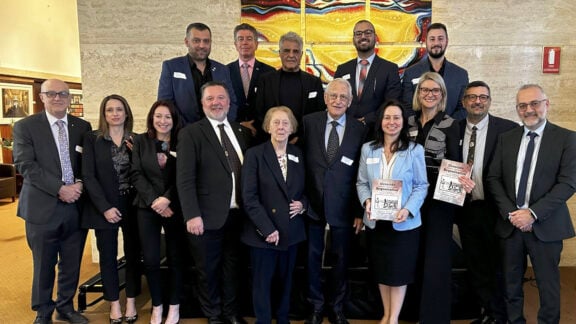Despite the large number of Australians of Greek descent, estimated to be around 900,000 in Australia, two-way trade figures continue to be poor and even in decline in recent years, especially in regards to exports from Australia to Greece.
According to some estimates, there are approximately 300,000 people of Greek heritage that live and work in the Greater Melbourne area, 175,000 in Sydney and NSW, 75,000 in Adelaide and 20,000 in Perth. Whatever the precise numbers, the fact is that our fellow Greeks in Australia are now an integral part of Australian society, making an invaluable and universally acknowledged contribution to the country’s economy and development. Trade figures could be significantly higher.
In a visit to Greece last February, I had the opportunity to meet with Australia’s new Ambassador to Greece, Jenny Bloomfield. In a discussion regarding what needs to be done to increase bilateral trade, Ambassador Bloomfield responded that the newly-established Hellenic-Australian Business Council in Greece, based in Athens with branches in Thessaloniki and Irakleio, will play an important role not only in supporting trade and investment through business matching, networking and two-way business delegations, but will also provide a framework for bilateral cooperation, dialogue and exchange.
In a subsequent meeting with Greece’s Deputy Minister of Foreign Affairs, Greek Australian Dimitris Dollis, I asked what Greece is doing to increase trade with Australia. Mr Dollis stated that pending the IMF approval of a further bailout program for Greece (at the time), the Greek Government was preparing to assist Greek companies that wanted to develop their export businesses.
Unfortunately Greece has never had a strong export program similar to that of other countries. Most Greek products are still consumed within the diaspora community with very few products trickling into the mainstream Australia market.
One of the reasons for this, is that importers in Australia have generally received weak marketing support from suppliers in Greece, more of which is needed to market and showcase Greek products to the mainstream market in a dynamic way.
In contrast Italian and Spanish products have been more successful in making inroads into the mainstream market. The Italian Community in Australia has traditionally supported Italian products from Italy with pride and most Italian restaurants would only source and serve products directly from Italy, creating both strong awareness and demand over the years.
The same applied to any Asian, Indian or other ethnic restaurant or cafe, which considered it trendy to serve and promote its homeland’s products. By contrast, Greek establishments started this trend only four or five years ago.
As the Hellenic Australian Chamber of Commerce and Industry, HACCI recognises that there is room for improvement and good opportunities for Greek products that are of extremely high quality.
Through a new campaign called “Go Greek” which MP for Dandenong and President of the World Hellenic Interparliamentary Association, John Pandazopoulos, has been strongly promoting, HACCI has been participating by using Greek food and beverage products at all its functions to as great an extent as possible.
In the past few months, there has been an increase in inquiries from Greek companies looking to export their products and services to Australia. HACCI has seen many companies scheduling business visits to Australia who come and do their own market research with a view to penetrating the Australian market with their products. It is interesting to note that these companies do not only represent the traditional products that come to mind such as olive oil, olives, or cheese, but a wide range of industries, products and services.
Many of these companies will be taking part in a planned trade mission scheduled to come to Melbourne in the next few months.
It’s a start. With the Hellenic-Australian Business Council underway in Greece and the Go Greek campaign here in Australia, we can begin to make inroads.
What’s clear is that we need new approaches to encouraging trade between our two countries ‘From little things big things grow’ as the song goes!








